Olympic mascots Phevos and Athena, siblings named for a pair of Greek deities, are catching an ungodly amount of abuse around Athens.
The pair were derided in various news articles, described as animated condoms and mutants from a nuclear meltdown. Their names were co-opted by anti-Olympic activists, who promptly firebombed government vehicles in February.
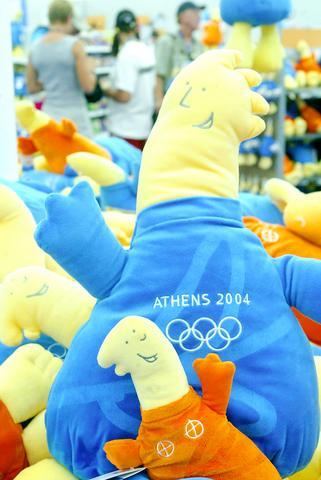
PHOTO: EPA
Oh, my gods, where did things go wrong?
It's hard to say. The mascots were not the vision of a single artist, like the Spanish stoner who conjured Barcelona mascot Cobi -- squiggled in about four seconds -- while in a state of drug-induced bliss.
Nearly 200 entries were submitted when Athens organizers put out the call for prospective mascots. The winning creatures were created by a team of six, including a philologist/historian. They were billed as two kids, brother and sister, "full of vitality and creativity, perhaps mischievous and hence lovable."
Their bloodlines were impeccable, too. Phevos (blue) was named for Apollo, the Greek god of light and music. Athena (orange), the host city's patron, was the goddess of wisdom. Yet the result was less then heavenly.
How to describe the pair?
Their bodies are built like an inverted funnel: Narrow at the neck, extra-wide at the bottom, more Oliver Hardy than Mount Olympus.
Their feet are supersized, yet only hold four tiny toes. Their outfits -- his blue, hers orange -- resemble off-the-rack discount caftans. Or robes from a very weird order of monks.
Their hands, like their feet, feature four digits -- although the fingers never see the sun, since the mascots' outfits inexplicably stretch right to their fingertips. Creative director Spyros Gogos, who declined interview requests, has said their shape was inspired by a bell-shaped Greek doll from the seventh century BC.
The locals have accepted Phevos and Athena, whose visage graces everything from key rings to kid's clothes. Although there's no sign of the pair in the Olympic stadium, pictures of the siblings greet arrivals at the media village with a cheery message: "Welcome Home."
And in the pantheon of Olympic mascots, the Greek duo remains head and shoulders -- if they actually had shoulders -- above the most-reviled Olympic mascot ever, Izzy of the 1996 Summer Games in Atlanta.
An NBC announcer maligned the mascot as "a genetic experiment gone horribly, ghastly wrong."
It's too late now, but the Greeks could have gone for reality over mythology in their mascots. How about BALCO, god of enhanced performance?
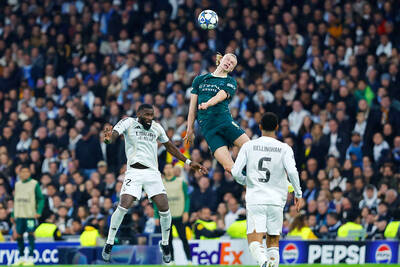
The pressure was already on Real Madrid coach Xabi Alonso before their 2-1 defeat to Manchester City on Wednesday in the UEFA Champions League raised further questions about his future. Arsenal remain perfect in this season’s competition and three points clear at the top of the standings after a 3-0 win against Club Brugge, while defending champions Paris Saint-Germain were held 0-0 at Athletic Bilbao. The clash between Madrid and City was the standout game of the round amid reports this week that Alonso had lost control of the locker room. Speculation over his position is likely to intensify after the latest
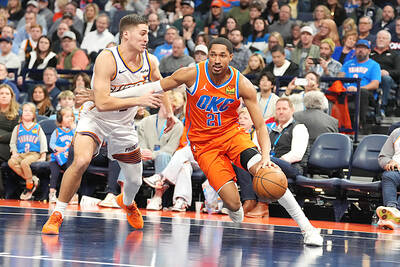
‘HIGH STANDARD’: The Thunder are on track for a Finals-Cup double after they scored 22 three-pointers in equaling the best 25-game start to a season in NBA history The Oklahoma City Thunder on Wednesday bagged a 16th straight victory, thrashing the Phoenix Suns 138-89 to romp into an NBA Cup semi-final clash with the San Antonio Spurs, who stunned the Los Angeles Lakers 132-119. NBA Most Valuable Player Shai Gilgeous-Alexander scored 28 points to lead the reigning NBA champions Thunder, who improved to 24-1 to equal the best 25-game start to a season in league history. They dominated from start to finish to book their place in the final four of the in-season tournament in Las Vegas, where they are tomorrow to take on the Spurs. The New York Knicks and
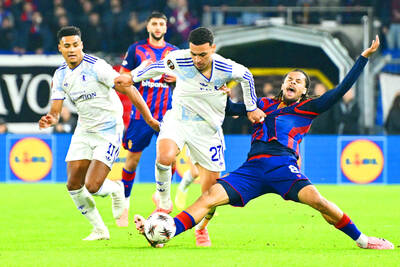
TOP OF THE TABLE: Evann Guessand put the visitors ahead early in the game and Flavius Daniliuc equalized before Youri Tielemans got the winner in the second half Aston Villa on Thursday extended their winning streak to eight games in all competitions with a 2-1 victory against Basel in the UEFA Europa League to secure at least a playoff spot. Villa were tied with Olympique Lyonnais, who beat Go Ahead Eagles 2-1, and Midtjylland, 1-0 winners over Genk, atop the standings of the second-tier European competition on 15 points with five wins from six games. They have bounced back from a poor start to the season and are third in the Premier League, including a 2-1 victory over leaders Arsenal on Saturday. At St Jakob-Park in Basel, summer signing Evann Guessand
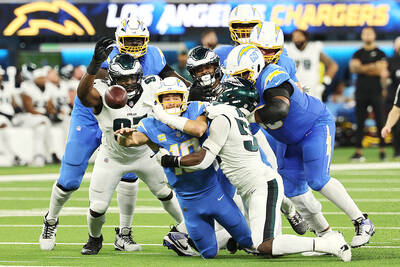
Tony Jefferson intercepted a Jalen Hurts pass in overtime to give the Los Angeles Chargers a 22-19 victory over the Philadelphia Eagles on Monday in an NFL thriller between playoff contenders. Justin Herbert, playing a week after surgery on his broken left (non-throwing) hand, withstood a career-high seven sacks to throw for 139 yards and a touchdown for the Chargers. Cameron Dicker kicked five field goals, including the 54-yard game winner in overtime. The Chargers defenders forced Hurts to throw four interceptions and surrender a fumble for a career-worst five turnovers as the Eagles fell to 8-5 with a third